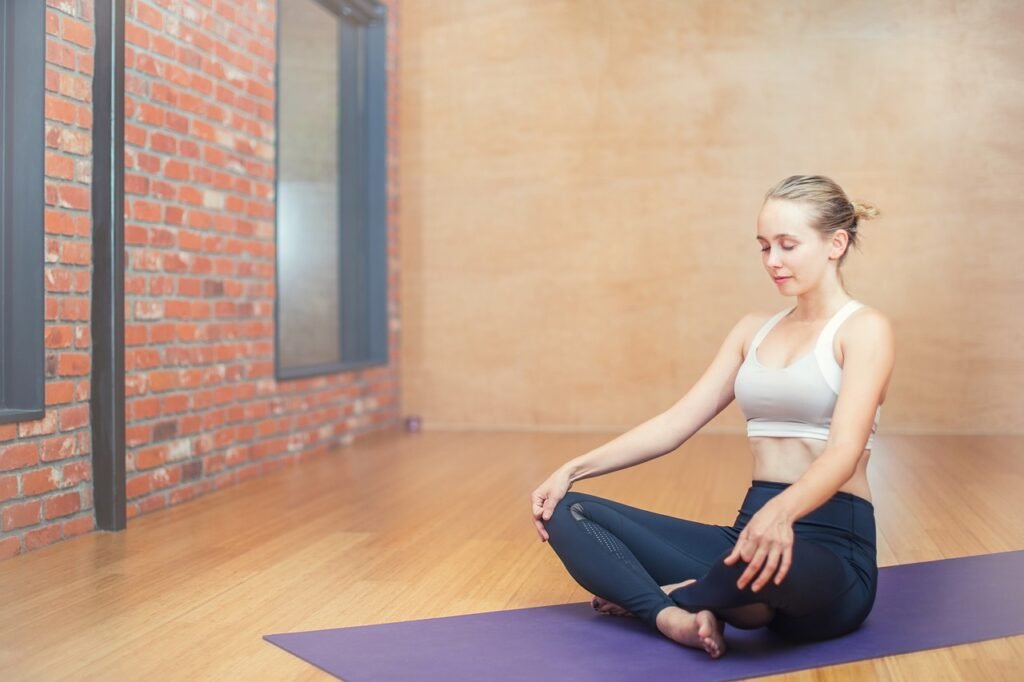Imagine a world where stress and anxiety melt away, leaving you with a deep sense of calm and tranquility. A world where you have the power to relax your mind and body, no matter how chaotic life may get. This is the promise of meditation, a practice that has been used for centuries to promote relaxation and inner peace. But how exactly does meditation contribute to relaxation? In this article, we will explore the profound effects of meditation on your mental and physical well-being, uncovering the secrets to unlocking a state of blissful relaxation through this ancient practice. Get ready to discover the transformative power of meditation and embark on a journey towards a more serene and tranquil existence.

Explanation of Meditation
Definition of Meditation
Meditation is a practice that involves training your mind and focusing your attention to achieve a calm and tranquil state. It is a technique that has been used for centuries to enhance relaxation, promote self-awareness, and cultivate inner peace. Through meditation, you can engage in various activities such as deep breathing, mindfulness, and visualization to achieve a state of mental calmness and clarity.
Brief History of Meditation
The origins of meditation can be traced back thousands of years ago to ancient civilizations in India, China, and other parts of the world. Meditation has its roots in religious and spiritual traditions, such as Buddhism and Hinduism, where it was used as a means to attain enlightenment and spiritual awakening. Over time, meditation practices spread to various cultures and underwent adaptations to suit different belief systems and philosophies.
Types of Meditation Techniques
There are numerous meditation techniques, each with its own unique approach and focus. Some of the most common types of meditation include:
-
Mindfulness Meditation: This technique involves paying attention to the present moment, observing your thoughts and sensations without judgment. It promotes a state of non-reactivity and acceptance.
-
Transcendental Meditation: Transcendental Meditation involves the use of a mantra, a repeated word or phrase, to achieve a state of deep relaxation and transcendence.
-
Loving-Kindness Meditation: This practice involves cultivating feelings of love, compassion, and kindness towards oneself and others. It aims to promote emotional well-being and reduce negative emotions.
-
Guided Visualization: Guided visualization uses guided imagery to create a mental picture of a peaceful and serene environment. This technique helps to relax the mind and induce a state of calmness.
-
Body Scan Meditation: This technique involves focusing your attention on different parts of your body, progressively relaxing each muscle group. It promotes physical and mental relaxation.
Stress Reduction through Meditation
Understanding Stress and Its Effects
Stress is a natural response to challenging or threatening situations, and it can have both physical and psychological effects on your body. Chronic stress can lead to a wide range of health problems, including high blood pressure, anxiety, depression, and weakened immune function. It is essential to find effective strategies to reduce stress and promote relaxation for overall well-being.
The Role of Meditation in Stress Reduction
Meditation has been proven to be a powerful tool for stress reduction. By engaging in meditation practices, you can activate your body’s relaxation response, which counteracts the stress response. Meditation helps regulate the activity of the sympathetic nervous system, responsible for the fight-or-flight response, and promotes the activation of the parasympathetic nervous system, responsible for rest and relaxation.
Scientific Studies on Meditation and Stress Reduction
Numerous scientific studies have demonstrated the effectiveness of meditation in reducing stress levels. For example, a study published in the Journal of Psychosomatic Research found that participants who practiced meditation experienced significant reductions in perceived stress levels compared to those who did not. Another study published in the Journal of Alternative and Complementary Medicine showed that meditation reduced both subjective and objective markers of stress, such as cortisol levels and blood pressure.

Regulation of Breathing
Connection between Breathing and Relaxation
Breathing plays a crucial role in relaxation. When you are stressed or anxious, your breathing tends to become shallow and rapid. This type of breathing activates the sympathetic nervous system, triggering the stress response. On the other hand, slow and deep breathing activates the parasympathetic nervous system, promoting relaxation and a sense of calmness.
How Meditation Cultivates Deep Breathing
One of the fundamental aspects of meditation is the regulation of breathing. Through specific breathing techniques, such as diaphragmatic breathing and alternate nostril breathing, meditation helps you cultivate deep and intentional breaths. These deep breaths activate the relaxation response, reduce the heart rate, and promote a state of relaxation.
Impact of Deep Breathing on Relaxation
Deep breathing has numerous benefits for relaxation. It increases the supply of oxygen to the brain and muscles, promoting a sense of vitality and reducing fatigue. Deep breathing also helps release tension in the body and calm the mind, allowing you to let go of stressful thoughts and worries. By incorporating deep breathing into your meditation practice, you can enhance relaxation and achieve a greater sense of peace and well-being.
Promotion of Mindfulness
Definition and Concept of Mindfulness
Mindfulness involves paying attention to the present moment with openness, curiosity, and acceptance. It is about fully engaging in the present experience, without judgment or attachment to thoughts or emotions. Mindfulness allows you to cultivate a non-reactive and non-judgmental stance towards your thoughts and experiences, which can lead to a greater sense of calmness and relaxation.
How Meditation Cultivates Mindfulness
Meditation is a powerful tool for developing mindfulness. Through meditation practices such as mindfulness meditation, you can train your mind to focus on the present moment and observe your thoughts and sensations without getting carried away by them. Meditation helps you develop a heightened sense of awareness and enables you to respond to stressful situations with greater clarity and equanimity.
Benefits of Mindfulness for Relaxation
Practicing mindfulness through meditation has numerous benefits for relaxation. By becoming more present and aware of your thoughts, emotions, and bodily sensations, you can disengage from negative thought patterns and break free from the grip of stress and anxiety. Mindfulness promotes a greater sense of calm and equanimity, allowing you to navigate life’s challenges with greater ease and grace.

Enhancing Focus and Concentration
Importance of Focus and Concentration in Relaxation
Focus and concentration are essential for relaxation. When your mind is scattered and distracted, it becomes challenging to unwind and let go of stress. Enhancing focus and concentration allows you to cultivate a single-pointed focus, enabling you to direct your attention towards the present moment and the relaxation techniques you are engaging in.
How Meditation Strengthens Focus and Concentration
Meditation is a practice that trains your mind to become more focused and concentrated. Through techniques such as breath awareness or mantra repetition, meditation helps you develop the ability to sustain your attention in the present moment. With regular meditation practice, you can strengthen your focus and concentration, making it easier to relax and unwind.
Impact of Improved Focus and Concentration on Relaxation
Improved focus and concentration have a profound impact on relaxation. When you can maintain a focused and concentrated state of mind, you can fully immerse yourself in the relaxation practices you are engaging in. This enhanced focus allows you to experience deep relaxation and tap into the rejuvenating benefits of rest and tranquility.
Encouraging Positive Thoughts
The Influence of Thoughts on Relaxation
Thoughts play a significant role in relaxation. Negative and stressful thoughts can keep your mind in a state of tension and prevent you from fully relaxing. On the other hand, cultivating positive and uplifting thoughts can create a sense of peace and joy, facilitating relaxation and well-being.
Meditation’s Role in Cultivating Positive Thoughts
Meditation is a powerful practice for cultivating positive thoughts and shifting your mindset towards a more positive outlook. Through meditation, you can become aware of your thought patterns and develop the ability to choose thoughts that are more supportive and uplifting. Meditation helps you cultivate a positive internal dialogue and promotes a greater sense of optimism and relaxation.
Implications of Positive Thinking for Relaxation
Positive thinking has significant implications for relaxation. When you have a positive mindset, you are better able to let go of stress, worry, and negative emotions. Positive thinking promotes a state of mental and emotional well-being, allowing you to experience a deeper sense of relaxation and contentment.
Cultivating Emotional Well-being
Understanding Emotional Well-being
Emotional well-being refers to the state of being in which you have a positive and healthy relationship with your emotions. It involves the ability to regulate and navigate your emotions effectively, leading to a greater sense of balance, resilience, and inner peace.
How Meditation Supports Emotional Well-being
Meditation is a powerful tool for cultivating emotional well-being. Through meditation practices such as loving-kindness meditation or mindfulness meditation, you can develop the capacity to observe and respond to your emotions with kindness and compassion. Meditation helps you build emotional awareness, allowing you to regulate your emotions more effectively and promote a sense of emotional well-being.
Impact of Emotional Well-being on Relaxation
Emotional well-being is closely linked to relaxation. When you are emotionally balanced and at ease, it becomes easier to let go of stress and tension. Cultivating emotional well-being through meditation enhances relaxation by reducing emotional turmoil, promoting a sense of calmness, and fostering positive emotions.
Nurturing Self-Awareness
Significance of Self-Awareness in Relaxation
Self-awareness is the ability to observe and understand your thoughts, emotions, and behaviors without judgment. It involves developing a deep understanding of yourself and your inner experiences. Self-awareness is crucial for relaxation as it allows you to identify and address sources of stress and tension.
How Meditation Develops Self-Awareness
Meditation is a powerful practice for nurturing self-awareness. Through mindfulness meditation and other introspective techniques, you can develop a heightened sense of self-awareness. Meditation helps you observe your thoughts and emotions without getting caught up in them, allowing you to gain insights into your inner world and patterns of reactivity.
Benefits of Self-Awareness for Relaxation
Self-awareness has numerous benefits for relaxation. When you are self-aware, you can identify the triggers and patterns that lead to stress and tension. This awareness empowers you to make conscious choices and take proactive steps to prevent or manage stress. Self-awareness allows you to cultivate a greater sense of control and agency over your relaxation practices, leading to more effective and rewarding experiences.
Cultivating a Relaxation Response
Understanding the Relaxation Response
The relaxation response is a natural physiological state that counteracts the stress response. It involves the activation of the parasympathetic nervous system, leading to a state of deep relaxation, reduced heart rate, and decreased muscle tension. Cultivating the relaxation response is essential for achieving a state of profound relaxation.
How Meditation Stimulates the Relaxation Response
Meditation is a powerful tool for stimulating the relaxation response. By engaging in meditation practices such as deep breathing, progressive muscle relaxation, or guided visualization, you can elicit the relaxation response and promote a state of deep relaxation. These practices help to activate the parasympathetic nervous system and counteract the effects of stress.
The Effects of the Relaxation Response on the Body
The relaxation response has significant effects on the body, promoting relaxation and overall well-being. When you activate the relaxation response through meditation, you experience a decrease in heart rate, blood pressure, and muscle tension. The relaxation response also helps to release hormones that counteract stress and promote a sense of calmness and tranquility.
Long-term Effects of Regular Meditation
The Cumulative Impact of Consistent Meditation Practice
Regular meditation practice has cumulative effects on the mind and body, leading to long-term benefits for relaxation. The more you meditate, the more you strengthen your neural pathways associated with relaxation and self-regulation. Consistent meditation practice creates a foundation for sustainable relaxation, enabling you to access deep states of calmness and tranquility more easily.
Sustained Benefits for Relaxation
The sustained benefits of regular meditation for relaxation are profound. Over time, meditation can help you become more resilient to stress, enhance your overall well-being, and promote a greater sense of inner peace. Regular meditation practice allows you to tap into a reservoir of relaxation resources that you can access whenever you need to unwind and rejuvenate.
Incorporating Meditation into a Relaxation Routine
Incorporating meditation into your relaxation routine can be a transformative practice. You can start by dedicating a few minutes each day to sit in silence and focus on your breath or engage in guided meditation. As you gradually cultivate a regular meditation habit, you can begin to expand your meditation sessions and explore different techniques, tailoring your practice to suit your specific relaxation needs. By integrating meditation into your relaxation routine, you can experience profound levels of relaxation and well-being.
